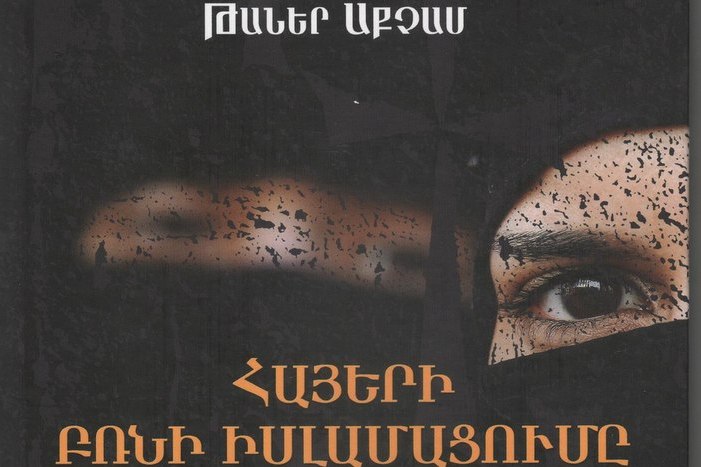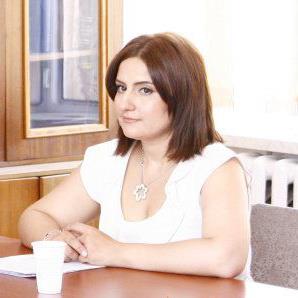“Türkçe’yi atalarımın yaşadıklarını daha iyi anlayabilmek için öğrendim”


(YEREVAN)
Taner Akçam’ın kitabını tercüme etme fikri nasıl ortaya çıktı? Akçam Ermenistan’da hangi çevrelerde tanınıyor?
7 yıldır Batı Ermenileri Sorunları Araştırma Merkezi’nde Türkçe Bölüm sorumlusu olarak çalışıyorum. Müslümanlaştırılmış Ermeniler konusunu ve bu insanların sorunlarını araştırmamızdan dolayı bu konuda yayınlanan her tür araştırma, kitap ve makale, hatta çekilen filmlere karşı büyük bir ilgimiz var. Taner Akçam’ın söz ettiğiniz kitabının basılmış olduğunu öğrenince ben ve müdürümüz Haykazun Alvrtsyan, bu kitabın Ermeniceye tercüme edilip, edilmeyeceğini Doktor Akçam’a sorduk. Kendisi Amerika’da bulunan ‘Jirayr Nışanyan’ Vakfı’nın bu kitabı tercüme ettirmeye karar verdiğini ve fakat hala bir tercüman arayışında olduklarını söyledi. Taner Akçam, daha sonra kitabının benim tarafımdan çevrilmesi ricasında bulunacağını belirtti. Ve böylece bu önemli araştırma Ermeniceye kazandırıldı.

Ermenistan’da Taner Akçam doğal olarak daha çok bilim adamları arasında ve siyasi çevrelerde tanınıyor. Diğer taraftan Ermenistan’da tarihçi olmayan çok sayıda Ermeninin de onu tanıdığını söyleyebilirim, çünkü Ermeni Soykırımı, sadece tarih ya da siyaset alanında çalışan kişilerin değil, bugün hala tüm Ermenilerin yakından ilgilendiği bir konu. Akçam’ın tanınmasının ilk nedeni Ermeni Soykırımını tanımış ilk Türk aydınlardan biri olması. Diğeri ise, kuşkusuz Soykırım konusunda çok ama çok değerli araştırmalar yapmış ve bize kazandırmış olması.
Ermenistan’da Türkologlar Türkiye’de yayımlanan yayınlara kolay ulaşabiliyorlar mı?
Geçmişteki durumla karşılaştıracak olursak, günümüzde Ermeni Türkologlar, Türkiye'de yayımlanmış eserlere eskiye göre daha kolay ulaşabiliyorlar. Mesela ben, 1994-99 yılları arasında üniversite öğrencisiyken bu dediğiniz o kadar kolay değildi. Hem şimdi olduğu kadar sık gidip gelen yoktu, hem de internet bu kadar yaygın değildi. Bu sebeplerden dolayı Ermenistanlı genç Türkologların bu konuda daha şanslı sayılabileceğini söyleyebilirim. Tüm bu gelişmeler nedeniyle ayrıca yeni neslin Türkolojiye olan ilgisi daha da arttı.
Türkoloji’nin Ermenistan’daki durumu nedir? Zayıf ve güçlü tarafları?
Ülkemizde Türkolojinin oldukça gelişmiş bir seviyede bulunduğunu söylemek mümkün. Türkiye tarihi, Ermeni tarihini bir şekilde etkilediği için Türkolojiyle ilgili araştırmalar, Yerevan Devlet Üniversitesi Türkoloji Bölümü, Ermenistan Ulusal Bilimler Akademisi Şarkiyat Enstitüsü ve Ermeni Soykırımı Enstitüsü’nün yanı sıra, başka birçok akademik kurumda ve araştırma vakıflarında da sürdürülmekte. Tabii ki, bu araştırmalar daha çok tarihle ilgili. Günümüzde genç Türkologlar Osmanlıcaya da daha büyük bir ilgi göstermeye başladı.
Ermenistan’da Türkolojinin güçlü tarafı, sanıyorum özellikle Türkiye’nin yakın komşumuz olması ve dediğim gibi Türkiye tarihinin Ermeni tarihini etkilemesi bu yoğun ilginin en güçlü uyaranı. Zayıf tarafı ise, tarih ve siyasete nazaran edebiyat ve diğer alanlara karşı bu kadar büyük ilginin olmaması. Hoş, o da bu koşullarda, diğer ilişkilerin geliştirilemediği bir ortamda gayet normal sayılabilir.
Önemli yazarların kitaplarının Türkçe’den Ermeniceye tercümesi ne anlamda önemli?
Türkiyeli önde gelen yazarların kitaplarının, Ermenice’ye tercümesi bence birkaç anlamda önemli. Tabii ki Ermenistanlı Türkologların ilgisini daha fazla tarih kitapları, özellikle Ermenilerle ilgili araştırmalar çekiyor ve çekmelidir de. Bu anlamda ilgi gösterilen kitapların başında Ermeni Sorunu ve Ermeni Soykırımı konulu kitaplar yer alıyor. Bunu normal karşılamalıyız. Ama diğer yanan Türkiye’yle ilgili farklı konulardaki önemli kitapların Ermenice’ye kazandırılmasında fayda var.
Mesela özellikle Türk modern edebiyatıyla ilgili kitapların da Ermeniceye tercüme edilmesini önemsiyorum, çünkü bu sayede de Ermeniler, şimdiki Türkiye’yi ve Türkleri tanıyabilir. Bu nedenle benim Türkçeden Ermeniceye tercüme ettiğim ilk kitap, tarihle değil edebiyatla ilgili oldu. 2009’da Ermenistan’da Ermenice olarak yayınlanan çağdaş Türk yazar Hasan Erkek’in “Eşik” kitabından sözediyorum. Sorunuza tek bir cümle ile yanıt vermem gerekirse, önde gelen yazarların kitaplarının Ermeniceye tercümesi, Ermenilerin Türkiye’yi, Türk toplumunu daha iyi tanımaları açısından önemli.
Hala Türkçe öğrenmenin ana sebebi ne peki? Kimilerinin beklediği gibi “Düşmanın dilini bilmek” mi, yoksa “Komşunun dilini öğrenmek” mi? Gençler neden Türkoloji’ye ilgi duyuyorlar?
Kendimden örnek vermeye çalışayım. Benim Türkçe ve Osmanlıca öğrenmemin ana sebebi kendi tarihimi, kendi atalarımın başlarına gelenleri daha iyi anlayabilmekti. Babaannemin büyük babası ve annesi, Soykırım yıllarında öldürüldü, halası ise kaçırıldı. Benim Türkolojiyi tercih etmemin başlıca nedenleri bunlardı. Bu nedenle sadece Türkçeyi değil, epeyce çetin olan Osmanlıcayı da öğrendim. Uzun çalışma ve sabır gerektiren, Soykırım konusuyla ilgili çok sayıda metni Osmanlıcadan Ermeniceye tercüme edip yayımlama konusunda bana itici bir güç veren husus, atalarımın soykırıma uğramış olmalarıydı. Fakat sanırım artık Ermeni gençlerin Türkolojiyi tercih etmelerinin nedeni, sadece ve sadece Ermeni meselesi ile ilgili araştırmalar yapmak değil. Mesela 2008-2011 yılları arasında Yerevan’da Hrachya Ajaryan Üniversitesi’nde Türk edebiyatı dersleri verdiğim zaman Türkoloji bölümünde okuyan öğrencilerin bu ilgisinin Türkiye'nin komşu bir ülke olmasından kaynaklandığını gördüm.
Meline Anumyan kimdir?
Meline Anumyan 1977’de Yerevan’da doğdu. 1999’da Erivan Devlet Üniversitesi Doğu Bilimleri fakültesinin Türkoloji bölümünden yüksek başarı derecesi ile mezun olduktan sonra Bilimler Ulusal Akademisi Ermeni Soykırımı Müze-Enstitüsünde doktora çalışmalarına başladı. 1999-2001 yıllarında aynı enstitüde araştırmacı asistan olarak çalıştı. 2008-2011 yıllarında Hrachya Ajaryan Üniversitesinde öğretim görevlisi olarak çalışarak Türk Edebiyatı dersleri verdi. 2012 yılında ‘İttihatçıların yargılamalarında Ermeni Soykırımı sorunu’ konusunda doktorasını tamamladı. 2009’dan itibaren Batı Ermenileri Sorunları Araştırma Merkezi, Bilim-Araştırma Vakfı’nda Türkçe Bölüm sorumlusu olarak çalışmakta..
2009’da Hasan Erkek'in ‘Eşik’ kitabının Ermeniceye kazandıran Anumyan tercümanlığın yanı sıra araştırmalarını kitaplaştırdı. 2011’de “İttihatçıların 1919–1921 tarihli dava tutanakları” adlı kitabı yayınlandı. 2013’te “Tanıma ve Telin: İttihatçıların Davaları (1919-1921 ve 1926)” isimli kitabı yayınlandı. Birçok ulusal ve uluslararası konferanslara katıldı, bilimsel makaleler yazdı. 2013’ten itibaren Ermeni Soykırımı Müze-Enstitüsü tarafından yayınlanan “Soykırım Uzmanları Dergisi” adlı bilimsel derginin redaksiyon kurulu üyesidir.


